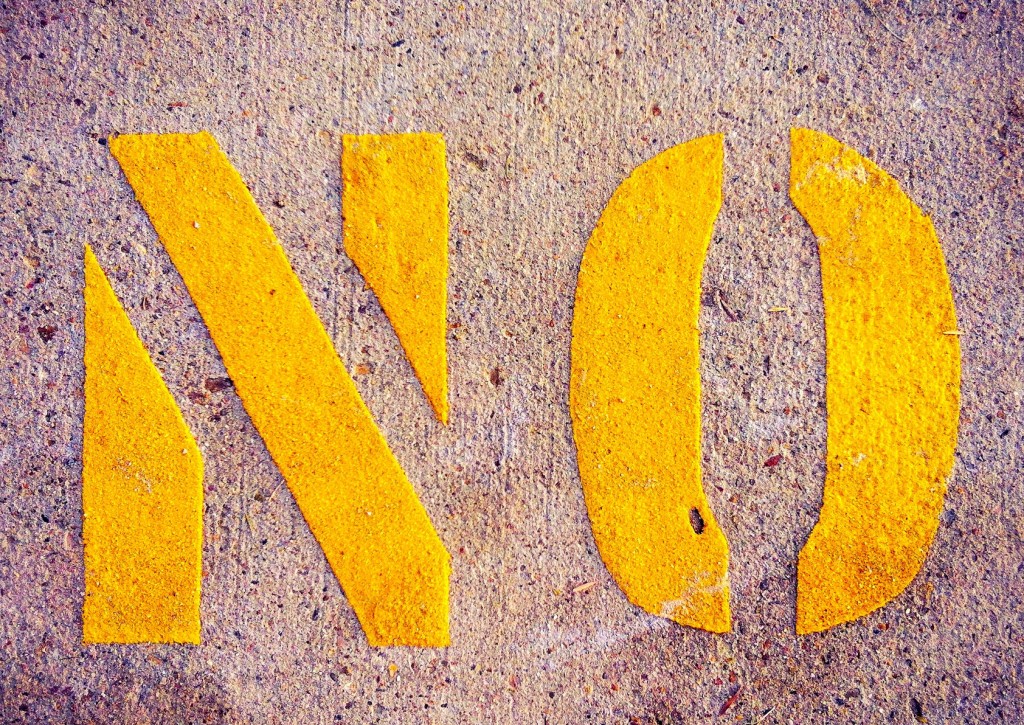
How to Say “No” With Confidence and Compassion
Photo Credit: Martin Howard, via Flickr Creative Commons
“Crazy busy” has become the new hip designation for those with packed schedules and over-extended lives. Being “too busy to breathe” has almost become a status symbol. But as we continue to blur the lines of healthy physical and emotional boundaries, all systems begin to decline.
The ability to say no is a valuable and effective tool of communication
The busier we are, the greater our need becomes to learn when to accept or decline requests for our time and energy. Our health will deteriorate and our relationships will become strained if we do not develop the discernment to make good choices and learn how to say no in a healthy way. We often end up in difficult situations when our stress levels increase, and this is because we are often confused about when and how to say yes or no in our daily encounters.
Why it’s Difficult to Say No
One reason that we avoid saying no is because we fear the disappointment and possible rejection of the one making the request. When we do say no, we often feel selfish and then guilty. To avoid those feelings, we wind up say yes on countless occasions when what we really wanted to say was no.
Authors Breitman and Hatch identify this tendency in their book, How to Say No Without Feeling Guilty. They write, “As much as we hate rejection, we also hate rejecting. Faced with a potentially guilt-inducing situation, it’s easier to take the path of least resistance. While inside we may be screaming, “No!” on the outside we summon up an agreeable smile and utter that fateful, “Okay!”
When we factor in the inevitable fatigue and resentment that usually accompanies the tendency toward over-committing, sooner or later we will find ourselves feeling compressed, stressed, and even depressed.
Saying No Can Be Empowering
No is a small but powerful word. The ability to say no is a valuable and effective tool of communication. As Anne Lamott reminds us in her book, Traveling Mercies, “No is a complete sentence.” When we decide to say no to something, we must be vigilant not to diminish it or bury it in apologies, long explanations, and justifications.
Learning when and how to say no will aid us immeasurably with finding more time and energy for the things we want, need and love to do. Put simply: when we feel better, we do better. When you learn to make decisions, not from succumbing to external pressures, but instead, from the internal wisdom of your heart, you will feel authentic and empowered. From this foundation of strength and confidence, you will have more to give and share with others in your life.
Rethink Your History with Saying No
How we feel about power and authority affects our ability to feel justified in saying no. In the past, we may have received many confusing messages about our right to set personal boundaries. Many of us were taught that saying yes indiscriminately to the requests of others equated with being an agreeable, helpful, and generous person. As a result, saying no seemed to imply the opposite. Saying no was discouraged as aggressive, stingy and uncaring behavior.
It’s time to let go of these generalizations. Instead, we can embrace not only the right, but the responsibility, to view any request as an opportunity to say yes, but also to say no, if and when we deem it appropriate for our well-being. Our physical, mental, emotional and spiritual resources are precious commodities and we owe it to ourselves to monitor them closely.
Silence the “Shoulds” and “Musts”
Albert Ellis, renowned twentieth century psychologist and founder of REBT (Rational Emotive Behavioral Therapy) was famous for his witty, highly effective, to-the-point expressions. In his book, How to Stubbornly Refuse to Make Yourself Miserable About Anything, he emphatically instructs that in order to do as the title suggests, we can begin here: “ Stop shoulding on your yourself!”
Ellis used this humorous idiom as an easy reminder to forgo the “shoulds” that we impose upon ourselves. Just like the same phrase that the familiar expletive would imply, it indicates something unfavorable, undesirable and personally damaging.
Every time you say, “I should…” you place an unreasonable demand upon yourself in order to allay the feelings of anxiety and guilt that would come with saying no. Extending his play on words, Dr. Ellis explains that “shoulding” always follows “musterbation.” This occurs when our self-talk is peppered with a relentless, self-sacrificing litany of why we must be all things to all people.
It’s easy to internalize these unhealthy and exhausting beliefs because everywhere we look, we are bombarded with unremitting, pervasive messages of what we “should” be doing in order to be a better person. Self-doubt increases as we fall victim to the constant pressure to be accepted. This is often accompanied by a deep seated fear that we will not be loved if we exercise our right to decline. But as the airline flight stewards teach us in their pre-flight instructions “Always put your oxygen mask on first.” Only after you have safe-guarded your own well-being, will you be able to turn to help another. We can’t give what we don’t have.
Every time you say yes just to appease someone else, you are not taking care of yourself. In effect, it can be a form of self-abandonment. But when you silence the shoulds and the musts, you uncover the right to speak your truth. Putting this awareness into action will support you in clarifying your personal boundaries as well as preserving your valuable energy for the many times you will consciously and mindfully decide to say yes.
Tips for Saying No
Pause, Buy Time, Reflect
Unless it is an emergency, you never need to respond to another’s request on the spot. Buy yourself some time using phrasing such as, “I will need to check on a few things first and then I’ll get back to you.”
If the person making the request presses you for an answer, simply repeat the phrase exactly as you said it the first time. This will simply and directly telegraph your confidence and resolve. Be cautious about adding any wimpy phrases like, “It sounds good, but I’m just not sure.” This may lead them to believe that you are leaning more to saying yes than no. While saying this might lessen your discomfort in the short run, it is likely to cause more issues later when they are doubly disappointed because of dashed expectations.
Use this time to review your priorities and obligations, which must include your personal needs for self-care. Very importantly, get quiet by taking a ‘Time-In’ to listen deeply to your feelings and intuition. Be clear and honest with yourself about what you truly want.
Respond With Clarity and Respect
When you say no, keep it simple and decisive. Extend your gratitude for their request and then let them know that you have decided to decline. You don’t have to justify your reasons for saying no. Remember that you are turning down a request, not the person.
You might say, “I want you to know that I appreciate your invitation, but I’m not able to do that.” When you are polite but not overly apologetic, it sends the message that you care but are clear about your decision. If you are pressed further, simply reply, “I’m just not able to, but thanks again.”
Embrace Compassion
Initially, learning how to say ‘No’ more frequently may feel confrontational and very uncomfortable, especially if you are used to saying ‘Yes’ most of the time. Give yourself permission to practice saying no by speaking up more frequently in everyday encounters about your preferences. Examples could include voicing your choice of a different restaurant instead of the one suggested or declining an invitation to go out with friends on a work night after a long, tiring day.
Have patience with yourself as you are learning how to use this powerful tool of communication. Remember that learning to say no presses us to increase our self-confidence and encourages us to trust ourselves more deeply with all of our life’s decisions. This is rigorous, internal work that asks a lot of us. While this process will require courage, calm and conviction, learning to say no can be one of the biggest favors you can do for yourself. It also benefits everyone in your life because it helps to create more space, time and energy for what is really important.
With mercy and attentiveness, we can learn to listen to that gentle, honest and trusted voice inside that continuously reminds us of what truly matters. We must make room to be responsive to these life-preserving messages of the heart. Business entrepreneur, educator and author Stephen Covey said it this way, “You have to decide what your highest priorities are and have the courage-pleasantly, smilingly, non-apologetically-to say ‘No’ to other things. And the way to do that is by having a bigger ‘Yes’ burning inside.”
What strategies do you use to make saying no easier for you?








